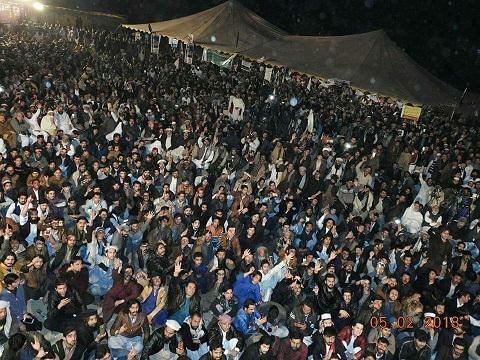KABUL, an energetic movement aimed to awaken the Pakhtun nations.
The killing of Naqeebullah Mehsud in the southern city of Karachi prompted thousands of activists to converge on Islamabad to press for seeking justice and an end to the oppression of Pakhtuns.
Haunted by years of neglect and suffering, the protesters listed five demands, including swift justice for Mehsud’s family. They want the authorities to arrest police officer Rao Anwar, blamed for the murder.
Anwar has a reputation for killing suspected terrorists and criminals in encounters, Pakistani media reports say. He has been involved in the killing of hundreds of people in what are locally called fake police encounters.
Former Pakistani lawmaker and Awami National Party (ANP) leader Afrasib Khattak said the protest was a manifestation of the oppression endured by more than 5 million FATA residents.
He told Pajhwok Afghan News Pakhtuns resident of the tribal belt had been victims of oppression for many years. “Pakhtuns in FATA in general and Waziristan in particular have been devastated by the armed conflict, but their suffering and agonies remained unnoticed.”
Khattak claimed Islamabad’s failure to implement reforms in FATA contributed to resentment as the region still languished under a draconian colonial-era legal regime known as the Frontier Crimes Regulations (FCR).
He quoted the Pakistan government as saying that 55,000 people had been killed in the fight against terrorism. For sure, he reiterated, 95 percent of victims were Pakhtuns — FATA residents.
About the Islamabad protest, the former senator said it was an historic and huge gathering of Pakhtuns. It was the first time they had raised voice for their rights.
Khattak blamed some other political and religious parties for the TV headquarters, the Supreme Court and other government buildings during demonstrations in Pakistan and thereby created problems for the people.
The Pakhtuns, however, demonstrated in a peaceful manner. The nationalist leader complained that Pakistani media did not cover the protest over the first two days, but Pakhtuns highlighted it in social media.
According to Khattak, the Pakhtuns of the FATA have been under control of Pakistani troops for the last 15 years. Political activities have been banned in the region, but the Islamabad protest defied all restrictions and informed the world of their problems.
A civil society activist and Peshawar-based journalist, Farooq Firaq, remarked the Pakhtuns had awakened after a long time to seek their rights. The protest in Islamabad had inspired the Pakhtuns, he believed.
“Many political parties or so-called Pakhtun nationalist groups have been left behind by the ongoing demonstrations. The nationalists, pretending to be serving Pakhtuns, but are in fact working for intelligence agencies,” he alleged.
According to him, Asfandyar Wali Khan, leader of the Awami National Party, on which Pakhtuns count a lot, addressed the protest on the fifth day and after stringent criticism.
sa/mud








GET IN TOUCH
NEWSLETTER
SUGGEST A STORY
PAJHWOK MOBILE APP